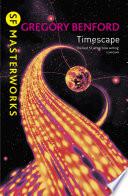Quotes from book
Timescape

Timescape is a 1980 science fiction novel by American writer Gregory Benford . It won the 1981 Nebula and 1980 British Science Fiction Award, and the 1981 John W. Campbell Memorial Award for Best Science Fiction Novel. It won the 1981 Ditmar Award for Best International Fiction. The novel was widely hailed by both critics of science fiction and mainstream literature for its fusion of detailed character development and interpersonal drama with more standard science fiction fare such as time travel and ecological issues.Pocket Books used the title of this book for their science fiction imprint.
“(Crank theories) always violated the first rule of a scientific model: they were uncheckable.”
Source: Timescape (1980), Chapter 17 (p. 235)
“No matter how much you plan for it, the real thing seems curiously, well, unreal.”
Source: Timescape (1980), Chapter 37 (p. 395)
“To shine is better than to reflect.”
Source: Timescape (1980), Chapter 16 (p. 220)
“Religions do not teach doubt.”
Source: Timescape (1980), Chapter 27 (p. 322)
“The personal was, compared with the tides of great nations, a bothersome detail.”
Source: Timescape (1980), Chapter 43 (p. 441)
““Free will again,” Cathy said.
“Or free won’t,” Peterson said mildly.”
Source: Timescape (1980), Chapter 23 (p. 291)
““The peers just fill the air with their speeches.”
“And from what I've seen, vice versa.””
Source: Timescape (1980), Chapter 5 (p. 46)
“At least being prosperous set one apart in England; here it guaranteed nothing, not even taste.”
Source: Timescape (1980), Chapter 11 (p. 134, concerning the USA)
“Modern economics and the welfare state borrowed heavily on the future.”
Source: Timescape (1980), Chapter 43 (p. 445)
“There was something about such reflex stupidity that never failed to irritate him.”
Source: Timescape (1980), Chapter 17 (p. 231)
“They will do anything for the worker, except become one.”
Source: Timescape (1980), Chapter 5 (p. 46, concerning the peers)
“Somehow to them, the press was always the judge of things scientific.”
Source: Timescape (1980), Chapter 17 (p. 236, concerning cranks)
“Deep ignorance, but still a kind that knew its limits. The limits were crucial.”
Source: Timescape (1980), Chapter 31 (p. 360)
Context: You had to form for yourself a lucid language for the world, to overcome the battering of experience, to replace everyday life’s pain and harshness and wretched dreariness with — no not with certainty but with an ignorance you could live with. Deep ignorance, but still a kind that knew its limits. The limits were crucial.